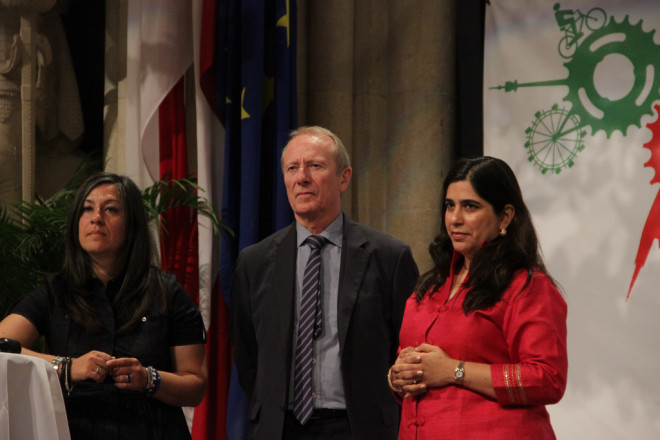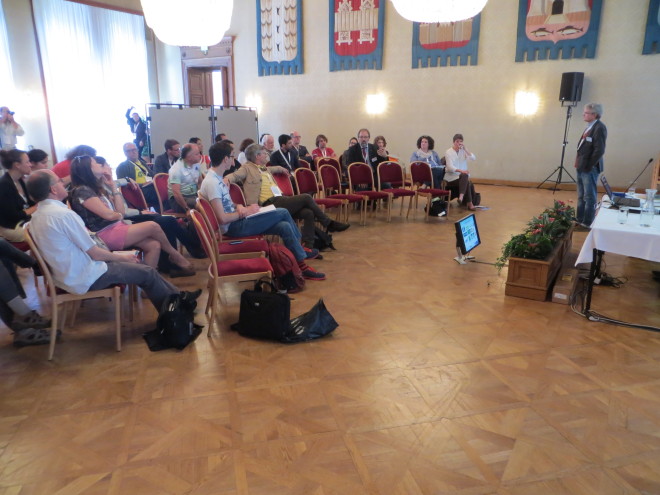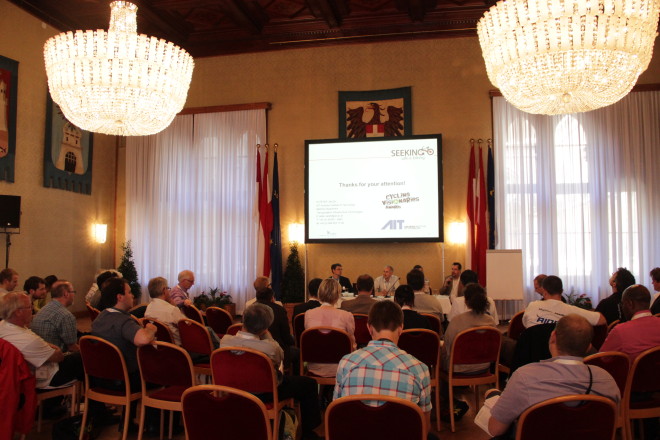
Velo-city Day 2 Roundup: EuroVelo, Mayors and E-Bikes
Velo-city is in full swing and Vienna is buzzing with bicycles as experts from all around the world continued to discuss all things cycling. On Wednesday, the spotlight was on Mayors trying to make cities cycling-friendly, the EuroVelo network, and E-bikes.
- Mayors - Cycling is a City Changer
- EuroVelo - The Future of Cycling Tourism
- E-Bikes - A Smart Choice?
Mayors - Cycling is a City Changer
While cycling tourism is growing, cities remain the place where people are using bikes the most – and, most importantly, on a daily basis and in order to get from A to B. That’s why Wednesday’s Plenary Session reunited Mayors and City Planners to talk about smarter, sustainable, and cycling-friendly cities.
"Our objective for Viennna is quality of life. It means for instance a city good for children." said Maria Vassilakou, Deputy Mayor of Velo-City host Vienna. "We want to create cities where people live not because they have to, but because they want to."
Hep Monatzeder, Deputy Mayor of Munich, can already look back at a number of successfully completed bike infrastructure projects in his city. In the host city of Velo-city 2007 the modal share of cycling has increased from 7% to 14%, and to over 20% some districts. "We tried to make cycling confortable and convenient giving cyclists the space they need," says Monatzeder, "even if it means taking it away from cars."
Monatzeder also explained the actions taken in his city in order to continue to increase the share of cycling. In fact, they were not limited to the development of infrastructure, but include a wide set of promotion, education and social measures focusing on the positive side of cycling.
"There are lots of ways to celebrate and attractively communicate the bicycle as a modern, urban mode of transport," Monatzeder concluded. "An urban cycling culture doesn’t only mean more cycling, but also better cycling."
Outside Europe as well, city planners are working on sustainable futures for their cities, as Shipra Narang Suri, Vice-President of the International Society of City and Regional Planners (ISOCARP) from India impressively demonstrated.
"The world is urbanizing and the fastest growing cities are in the developing world. Over the next 5 years the fastest growing city is expected to be Kinshasa in the Democratic Republic of Congo," she began her mesmerizing presentation. "Some of these cities are extremely dense, and because of that public service and public space have deteriorated, which includes mobility. Mobility and sustainability are therefore the two major challenges these cities face. But land use and transport policies are often completely disconnected."
Suri thinks that cities that will tackle mobility will be more sustainable. Yet, for example, nowadays less than 20% of people cycle to work in Beijing, once one of the world's bicycle strongholds. "Cycling is a positive choice in the north, it is not in the south. Cycling is an act of desperation, instead of a real choice. People think modernization is about driving a car," Suri deplores. "Safety is a huge issue. 78% of traffic deaths in Mumbai were pedestrians and cyclists. At the same time, only 0.8% of the transport budget in Dehli is being spent on non motorized transport."
She concluded her speech with a fervent call to the audience to take action in spreading the cycling world to funders, donors, and institutions that build transport infrastructure in the developing world.
"Cycling will not solve all the problems of this world, but it is an extremely important piece of the solution."
In the afternoon 8 mayors from 8 different countries did showcase their work of cycling developmenton how cities can support their cyclists. From Vienna to Nantes, Bratislava to Stockholm, Prag to New York, the common denominator was the diversity of actions taken in order to promote cycling.
Talks on urban cycling and urban cycling cultures will continue throughout the conference.
EuroVelo - The Future of Cycling Tourism
EuroVelo, the network of long-distance cycling routes developed by ECF and its partners will total over 70,000 km when complete. That’s almost twice around the world! Without question, such a huge network deserved an important place at Velo-City 2013. During yesterday’s second day, Cycle Tourism indeed took centre stage at the conference.
Adam Bodor, ECF’s director of EuroVelo Cycle Tourism and Regional Policy, kicked of a workshop on EuroVelo with a guide on how to establish, organise and operate National EuroVelo Coordination Centres. “We not only want to help our partners to manage the individual routes successfully, but also sustainably,” explained Adam.
Daniel Mourek of Nadace Partnerstvi (Czech Republic) agrees. “When we’re thinking about a network like EuroVelo, we also need to think about coordination at the European level,” Daniel said while presenting the thriving business of cycling-friendly service schemes.
A lively discussion was had about whether European standards for cycling friendly services should be created. Organisations with existing systems saw potential in introducing standard criteria across the continent while retaining their established brand. Whereas those that don’t currently have them thought that introducing a European brand would be helpful for the customers
Cycle Tourism continued to be big on the agenda during the afternoon.
In a session chaired by Daniel Mourek, Jesper Pørksen of the Danish Cyclists' Federation presented the potential of the cycle tourism market in Denmark. Wolfgang Richter and Raimund Jennert of German ECF member ADFC, supported by Mandy Schwalbe-Rosenow from Büro Radschlag, then focused on the first-class segment of cycle tourism: the classification process of the ADFC’s Premium cycle routes – which, of course, are still free to use for anyone with a bicycle...
Presentations about Cycle Tourism will continue tomorrow. “With so much attention to it, this could really be a bumper year for Cycle Tourism,” says Adam Bodor.
For EuroVelo lovers, our team also has made aVelo-city Eurovelo Diary on eurovelo.org
E-Bikes - A Smart Solution?
To cycle in a smart city, would you need a smart bike as well? ECF has long recognized E-Bikes or Pedelecs as bicycles, and they are definitely on the rise: in Germany alone, more than 1 million electrically assisted bicycles are already on the roads.
Along with other specialists, ECF’s expert for E-Bikes Ceri Woolsgrove was trying to find out whether E-bikes are indeed a smart choice, in a session he chaired on Wednesday, Velo-City 2013’s second day of session.
3 scientists, Sandra Wegener, Michael Meschik and Peter Saleh from the SEEKING project in Austria gave presentations on the tentative conclusions of their study on pedelecs and road safety.
Subjects were asked to ride their pedelecs around a specially designed course to see where the danger or accident points were. The preliminary conclusions seem to be that pedelec users are at greatest risk when they are just beginning to use the bike. It does seem to handle a little differently especially at tight sharp cornering where they fared worse than conventional bikes on the specially designed track.
However experienced riders had no problems whatsoever, even in very wet conditions.
This seems to bode well for the future of pedelecs. Yes they do handle a little differently and at times have more in common with moped handling but with more use comes handling on a par with conventional bicycles.
There were however also one or two problems with the electronics in one or two of the bikes which echoes the controversial findings of a recent report by the German consumer magazine ADAC/Stiftung Warentest http://www.bike-eu.com/Home/General/2013/6/Witch-Hunt-on-E-bikes-Taking-Place-in-Germany-1276661W, which found many pedelecs sold in German shops had some issues with both frames and electronics.
This has been called a Witchhunt by some in the industry and a poorly executed research. It is important then that research like the SEEKING project is continued and taken up by other research organisations. This is currently only one of only two or three pieces of research on these types of vehicles and it is important that we continue to monitor and improve this very new, but increasingly popular, type of vehicle.
The full results from the project will be made public soon and we will bring them to you.
- Log in to post comments
Contact the author
Recent news!
Upcoming events
Contact Us
Avenue des Arts, 7-8
Postal address: Rue de la Charité, 22
1210 Brussels, Belgium












